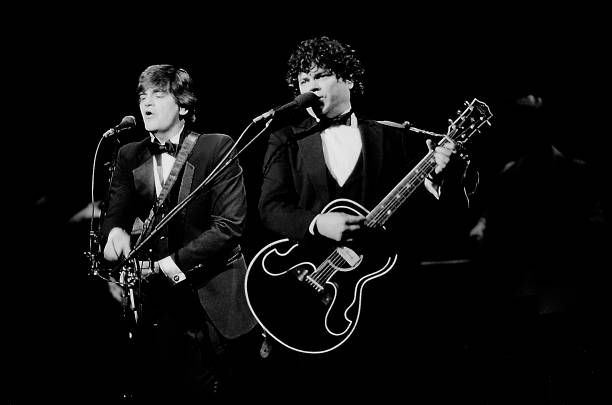 Introduction and Short Summary of the Song
Introduction and Short Summary of the Song
“Christmas Eve Can Kill You” is one of The Everly Brothers’ most poignant and emotionally raw songs, released in 1972 on their album Stories We Could Tell. Unlike their earlier hits filled with youthful romance and playful energy, this song is somber, reflective, and deeply moving. Written by Dennis Linde, it paints a vivid picture of loneliness and despair during the holiday season, contrasting the joy often associated with Christmas with the pain felt by those who are isolated. Through their heartfelt harmonies, Don and Phil Everly transformed the track into a haunting ballad that resonates with listeners who know the ache of solitude during a time of celebration.
Origins of the Song
By the early 1970s, The Everly Brothers’ commercial dominance had waned, but their artistry was maturing in new directions. Stories We Could Tell, produced by Paul Rothchild (famed for his work with The Doors), was an attempt to reposition the duo in the contemporary singer-songwriter era. The album featured material from respected writers of the time, including Kris Kristofferson, Carole King, and Dennis Linde.
---> Scroll down for the VIDEO
Linde’s “Christmas Eve Can Kill You” stood out as a stark, unconventional Christmas song. Instead of holiday cheer, it emphasized despair and alienation, themes that resonated with the Everlys’ ability to express vulnerability through harmony. The decision to include it on the album reflected both their artistic boldness and their willingness to break from convention.
Why The Everly Brothers Released “Christmas Eve Can Kill You”
The Everly Brothers recorded and released “Christmas Eve Can Kill You” because it allowed them to showcase a darker, more mature side of their artistry. Rather than adding another cheerful holiday tune to the canon, they offered a sobering reminder of how the season can magnify feelings of loneliness and exclusion.
---> Scroll down for the VIDEO
The choice aligned with their career stage at the time: they were no longer chasing teenage audiences but instead connecting with older listeners who appreciated more serious and nuanced storytelling. The song provided an emotional depth that matched the broader themes of Stories We Could Tell.
The Message Conveyed in the Song
At its core, “Christmas Eve Can Kill You” conveys the heartbreak of being alone on a night associated with family, joy, and togetherness. The narrator describes hitchhiking through the cold, watching others celebrate while he remains outside, yearning for warmth and connection.
Key themes include:
-
Loneliness: The central image of the song is the crushing weight of being alone on Christmas Eve.
-
Exclusion: The narrator feels shut out from the warmth of homes and relationships.
-
Harsh Reality vs. Festive Ideal: The contrast between the holiday’s joyous image and the narrator’s pain intensifies the song’s emotional impact.
-
Empathy: The song encourages listeners to consider those who may not share in holiday cheer.
Rather than cynicism, the song carries compassion, giving voice to those who suffer during a season often dominated by idealized images of happiness.
The Recording and Musical Characteristics
The Everly Brothers’ performance of “Christmas Eve Can Kill You” is restrained yet devastatingly powerful.
-
Vocals: Don and Phil’s harmonies are intimate, fragile, and deeply moving, embodying both sadness and empathy.
-
Instrumentation: Acoustic guitar and subtle backing instruments create a sparse, wintry soundscape that mirrors the loneliness in the lyrics.
-
Mood: Haunting, melancholy, and reflective, with a stark contrast to typical Christmas songs.
-
Style: A blend of folk, country, and singer-songwriter balladry, fitting the early 1970s musical landscape.
The production’s simplicity ensures the focus remains on the emotional weight of the vocals and the storytelling.
Cultural and Commercial Impact
Commercially, “Christmas Eve Can Kill You” was not a hit single and remains a deep cut within the Everly Brothers’ catalog. However, it gained recognition among critics and dedicated fans as one of the most striking songs on Stories We Could Tell. Its lack of mainstream appeal was partly due to its unconventional subject matter—holiday music buyers typically sought cheerful, uplifting tunes rather than stark ballads of loneliness.
Culturally, the song holds a unique place as one of the few Christmas songs to directly confront the darker realities of the season. It broadened the emotional palette of holiday music, standing alongside other reflective pieces that acknowledge the pain of those who feel left out during festive times. Over time, it has gained a reputation as one of the Everlys’ most underrated and emotionally affecting performances.
Legacy of “Christmas Eve Can Kill You”
Today, “Christmas Eve Can Kill You” is regarded as one of The Everly Brothers’ most powerful late-career recordings. While it never achieved the cultural ubiquity of their 1950s and early 1960s hits, it demonstrates their ability to evolve artistically and tackle mature themes with honesty and grace.
For their legacy, the song underscores their versatility. The Everly Brothers were not only purveyors of sweet harmonies and teenage romance but also interpreters of deeper, more painful human experiences. Their rendition of “Christmas Eve Can Kill You” proves that their harmonies could communicate empathy and despair as effectively as they once conveyed joy and longing.
More broadly, the song stands as a reminder of the importance of acknowledging all facets of the human condition in music—even during times of celebration. Its relevance endures as a poignant anthem for anyone who has felt isolated or forgotten during the holidays.
Over fifty years after its release, “Christmas Eve Can Kill You” continues to resonate as a hauntingly beautiful piece of music. It remains a testament to The Everly Brothers’ artistry, their emotional honesty, and their willingness to explore the shadows behind even the brightest traditions.